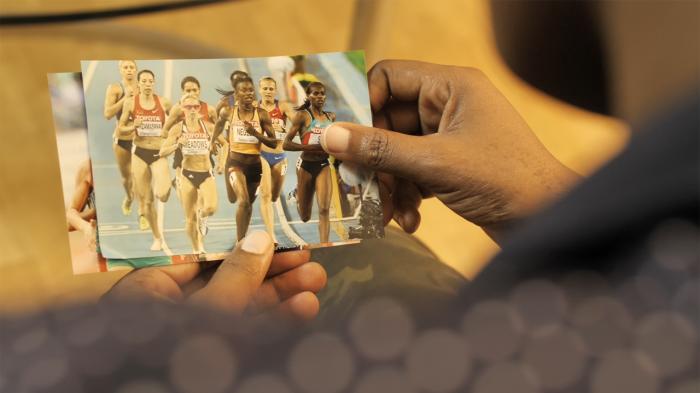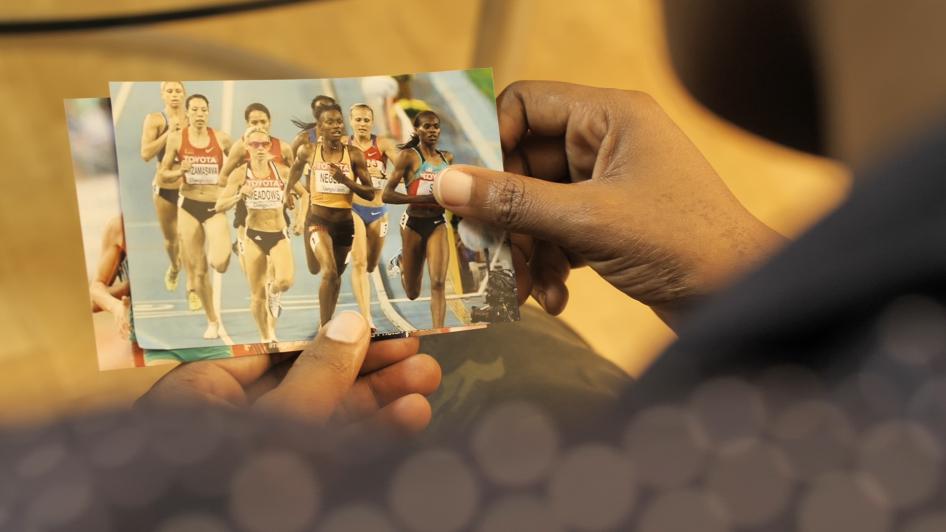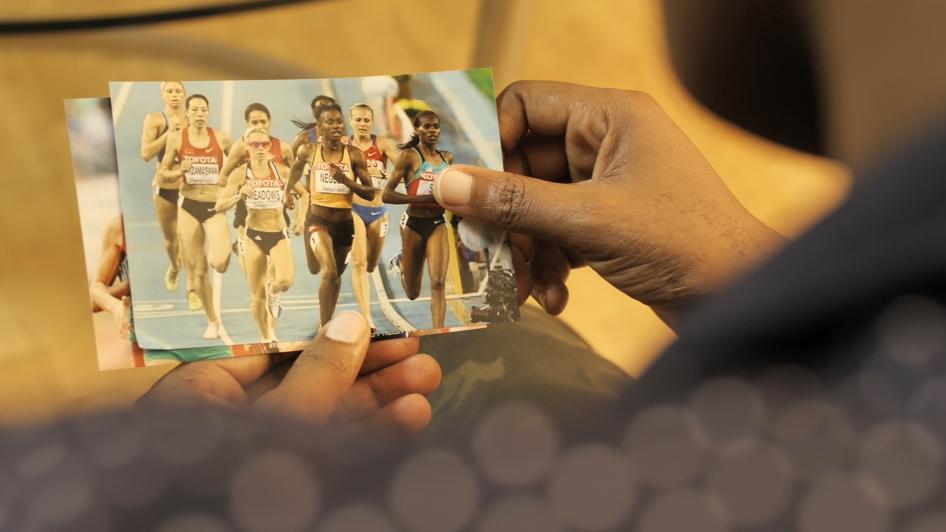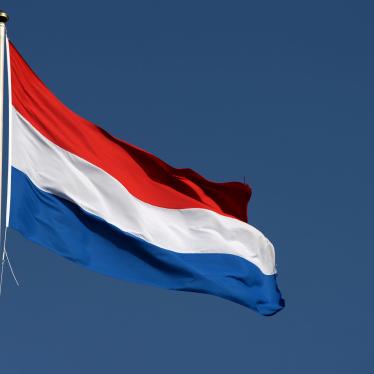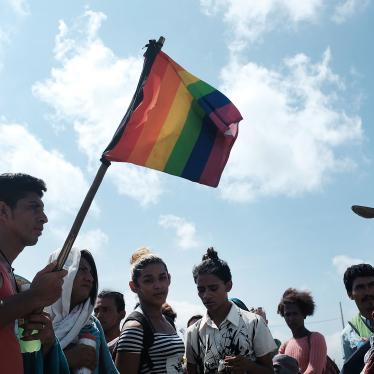- Women athletes, largely from the Global South, are targeted and harmed by “sex testing” regulations.
- Women being observed under the regulations, and in some cases being compelled to undergo a medical examination, amounts to policing women’s bodies based on arbitrary definitions of femininity and racial stereotypes.
- Sport governing bodies – including World Athletics and the International Olympic Committee – should remove all regulations that require medically unnecessary interventions for continuing eligibility.
(Geneva) – Women track and field athletes, largely from the Global South, are abused and harmed by “sex testing” regulations, Human Rights Watch said in a report released today. The regulations target women in running events between 400 meters and one mile, and compel women they target to undergo medical interventions or be forced out of competition.
The 120-page report, “‘They’re Chasing Us Away from Sport’: Human Rights Violations in Sex Testing of Elite Women Athletes,” documents the experiences of more than a dozen women athletes from the Global South who have been affected by sex testing regulations. Human Rights watch found that global regulations that encourage discrimination, surveillance, and coerced medical intervention on women athletes result in physical and psychological injury and economic hardship. The International Olympic Committee – the supreme body in global sports – is developing guidelines to address human rights violations caused by sex testing policies.
“World Athletics has targeted women from the Global South for decades, treating those with high testosterone as less than human,” said Payoshni Mitra, scholar and athlete rights advocate. “These regulations demean women, make them feel inadequate, and coerce them into medical interventions for participation in sports. Modern sport should adapt itself to support inclusion and non-discrimination rather than perpetuate exclusion and discrimination.”
Human Rights Watch partnered with expert scholars Payoshni Mitra and Katrina Karkazis to conduct research in 2019, interviewing affected athletes, coaches, and other officials and experts relevant to this issue, as well as reviewing court and medical documents.
For decades, sport governing bodies have regulated women’s participation in sport through “sex testing” regulations that target women athletes with some variations in their sex characteristics that cause their natural testosterone levels to be higher than typical. The regulations deny these women the right to participate as women for running events between 400 meters and one mile, unless they submit to invasive testing and medically unnecessary procedures. These practices violate fundamental rights to privacy, health, and non-discrimination. Women from the Global South – including runners such as Dutee Chand from India and Caster Semenya from South Africa – have been disproportionately harmed.
To identify those covered by the regulations, officials subject all women athletes’ bodies to public scrutiny and require those who seem “suspect” to undergo degrading and often invasive medical examinations. They amount to policing women’s bodies based on arbitrary definitions of femininity and racial stereotypes. There is no scientific consensus that women with naturally higher testosterone have a performance advantage in athletics. Despite a wide range of testosterone levels among men, there have never been analogous regulations.
Women interviewed described intense self-questioning, shame, and withdrawal from sport – even when it was their livelihood – and suicide attempts. A runner who had been sex tested and subsequently disqualified said: “I wanted to know the results…. I wanted to know who am I? Why are they testing me? They’re not testing other girls…. I wanted to know why they have taken me to the hospital, removing the clothes.”
In addition to the human rights violations inherent in the regulations, the impact of their enforcement extends beyond sport. Success in athletics can deliver economic stability for women. From scholarships to housing and food, the benefits can come early and may also lead to stable employment outside of sport. Many athletes interviewed grew up in abject poverty. Their success in athletics often became a source of livelihood for their extended families. In some cases, their abrupt departure from sport after being disqualified devastated their and their families’ economic well-being.
Health experts, human rights advocates, and elite athletes have increasingly spoken out against the regulations. In a 2020 report, the Office of the United Nations High Commissioner for Human Rights recommended immediately revoking sex testing regulations for women athletes. The World Medical Association has recommended that physicians around the world should not observe the regulations as they violate medical ethics.
In 2019, 25 French women athletes wrote an open letter to World Athletics president Sebastian Coe, International Olympic Committee president Thomas Bach, and health and sports ministers around the world, saying, “These women are human beings and high-level athletes like us. We share with them the same passion for sport and its values. Their health and their future are in danger. The image of the sport is once again dirty. Human rights and human dignity are flouted.”
Roxana Maracineanu, France’s minister of sports, reacted saying, “we have women who compete who are stronger than other women, we have men who compete who are stronger than other men, it is the principle of sport and the best wins. I do not understand from a sporting point of view, why in categories of men, men like Usain Bolt, Michael Phelps, Ian Thorpe and others have the opportunity to dominate their category, and why in a women’s category, women do not have the right to dominate in their category.”
“Animated by erroneous beliefs about testosterone, biology, and gender, and steeped in paternalistic language around ‘protecting’ women athletes, these regulations do untold harm to women, especially from the Global South,” said Katrina Karkazis, visiting professor of women’s, gender and sexuality studies at Emory University, and fellow at Yale Global Health Justice Initiative. “These regulations are damaging because the underlying assumptions are inherently sexist – that women athletes are always inferior to men athletes, so we must police women’s sports in order to protect women. This policing does nothing to protect women; it only serves to harm them.”
The global sporting industry is regulated by a complex system of local, national, regional, and international governmental and nongovernmental entities – including sport governing bodies – that have different relationships with official human rights mechanisms. Sport governing bodies have a particular role in regulating sport around the world.
Governments across the world have committed to gender equality and non-discrimination against women. Governments are obligated to protect the rights of athletes representing their countries and competing on their soil. Human rights standards apply to all. Policies that are inherently discriminatory – such as sex testing regulations – fly in the face of the Olympic movement’s commitments to dignity and equality for all, Human Rights Watch said. Regulating fair play is a valid undertaking for sport authorities; committing human rights violations in the process is not.
World Athletics should immediately rescind the regulations. The International Olympic Committee (IOC) – the supreme authority in international sports – should uphold the fundamental principles of the Olympic Charter, including Principle 4, which states that “every individual must have the possibility of practising sport, without discrimination of any kind,” and Principle 6, which states that “The enjoyment of the rights and freedoms set forth in this Olympic Charter shall be secured without discrimination of any kind, such as race, colour, sex, sexual orientation, language, religion, political or other opinion, national or social origin, property, birth or other status.”
The IOC should publicly acknowledge the racial and gender biases in sex testing regulations, and remove all regulations that require medically unnecessary intervention for continuing eligibility.
“In scrutinizing and excluding women competitors based on their natural hormone levels, the World Athletics regulations stigmatize, stereotype, and discriminate against all women,” said Agnes Odhiambo, senior women’s rights researcher at Human Rights Watch. “Being compelled to undergo a medical examination can be humiliating as it is medically unnecessary. Identifying athletes through observation and suspicion amounts to a policing of women’s bodies based on arbitrary definitions of femininity and racial stereotypes.”
Selected testimonies from the report:
“[The federation official told me] I need to take the medication. She told me the IAAF wanted the details about me and if I can take the medication and maybe do surgery.”
— D.B., athlete who was sex tested and ruled ineligible under World Athletics regulations.
“The doctor asked me about my life and did a physical exam where she checked my chest, my genitals, even inside, and she asked did I menstruate, did I have a girlfriend or boyfriend.”
— P.H., athlete who was sex tested and ruled ineligible under World Athletics regulations.
“During the test, they just talked about [another athlete who had been tested]. They didn’t say anything about an undue advantage. And they said they’d take away my medals like they did with the [other athlete’s] medals. They said if I stop [competing] then they won’t do anything. But if I continue, they’ll take away everything. I didn’t understand what they were saying. I wondered: What is testosterone? … I didn’t understand why testosterone was important.”
— P.F., athlete who was sex tested and ruled ineligible under World Athletics regulations.
“My life is over – no coach is interested in training me; no job. I couldn’t even eat.”
— J.G., athlete, describing the impact of being ruled ineligible.
“For [World Athletics] to say that these athletes should take drugs to reduce their [testosterone] levels, which can create other side effects, it’s horrendous. That’s almost – in my simplistic way of looking at it, that’s almost a doping issue in itself. Forced doping – systemic doping.”
— J.Q., a coach for several women impacted by the World Athletics sex testing regulations.
“Based on the conversation I had with the patient, I can say that my impression is that she did not understand or did not know exactly what was done to her, and what further care or therapy was required or what the consequences are for her.”
— Dr. Thomas Seppel, an endocrinologist in Germany who examined a woman athlete from the Global South who underwent a gonadectomy in an attempt to continue competing under the World Athletics regulations.
